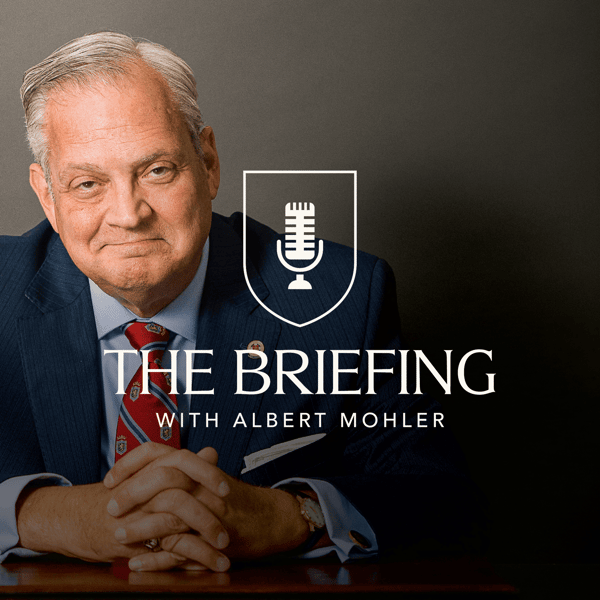Monday, May 12, 2025
The Briefing with Albert Mohler
The Southern Baptist Theological Seminary
4.8 • 7.9K Ratings
🗓️ 12 May 2025
⏱️ 26 minutes
🧾️ Download transcript
Summary
Part I (00:14 - 14:25)
The Death of Justice David Souter: The Reclusive ‘Stealth Justice’ Dies at 85
Part II (14:25 - 16:16)
‘No More Souters’: Justice Souter’s Appointment Taught Republicans That a Candidate Must Be Conservative in Conviction, Not Just Temperament
Part III (16:16 - 25:09)
Conservatives and Liberals Both Now Show Concern on Transgender Revolution: Major Editorial Boards Agree on Significance of HHS Transgender Procedures Report
- Treatment for Pediatric Gender Dysphoria: Review of Evidence and Best Practices by Department of Health and Human Services
- The Cass Review by The National Archives (Hilary Cass)
- Protecting Children From Chemical and Surgical Mutilation by The White House
- The U.S. Catches Up on Gender Medicine by The Wall Street Journal (The Editorial Board)
- Good questions about transgender care by The Washington Post (Editorial Board)
Sign up to receive The Briefing in your inbox every weekday morning.
Follow Dr. Mohler:
X | Instagram | Facebook | YouTube
For more information on The Southern Baptist Theological Seminary, go to sbts.edu.
For more information on Boyce College, just go to BoyceCollege.com.
To write Dr. Mohler or submit a question for The Mailbox, go here.
Transcript
Click on a timestamp to play from that location
| 0:00.0 | It's Monday, May 12, 2025. I'm Albert Mueller, and this is the briefing, a daily analysis of news |
| 0:11.6 | and events from a Christian worldview. Last Thursday, David Souter, former Associate Justice of the |
| 0:17.4 | United States Supreme Court, died at age 85. Other headline news, including the |
| 0:22.9 | election of a new Pope, dominated the news coverage. But today we need to come back to the death |
| 0:28.5 | of Justice Souter and come to understand what this means, because Justice Souter turned out to be a key |
| 0:33.6 | transitional figure in the entire history of the United States Supreme Court, certainly in the |
| 0:37.9 | modern era and not for reasons just about anyone had expected. So let's just consider the great |
| 0:44.0 | issue of the United States Supreme Court over the course of the 20th century. By the time you get |
| 0:49.0 | into the early decades of the 20th century, there was an increasing influence coming from the justices who |
| 0:55.1 | identified as progressives on the court in one way or another. And so you had the big name justices |
| 1:01.3 | like Oliver Wendell Holmes Jr. and others who dominated the court. And they were pragmatists of a |
| 1:07.3 | sort. They were committed to what they called the common law, but that meant that the common law |
| 1:11.9 | was constantly evolving, and sometimes that meant, especially well into the 20th century, at the |
| 1:17.4 | expense of the text of the Constitution of the United States. The Supreme Court was in effect |
| 1:22.3 | moving left, and this became even more pronounced, especially in the 1950s and the 1960s during the time of Chief Justice Earl Warren in particular, but even in what followed, which was the court under Chief Justice Warren Berger, basically you still had a liberal direction on the court. |
| 1:39.9 | And this meant that what was dominating and not just on the court, but in American law schools, |
| 1:45.0 | was the idea of a so-called living constitution. |
| 1:47.9 | The claim was that the Constitution was, after all, a document that goes back to the late 18th century. |
| 1:52.9 | You can't expect to run and to adjudicate a modern nation, not to mention the most powerful |
| 1:59.1 | nation on earth, in a modern age with electricity |
| 2:01.9 | and cars and air forces and nuclear bombs and all the rest, you can't expect the actual text |
| 2:08.0 | of the U.S. Constitution to govern. Rather, it is to give basic directions, and it is unfolding |
... |
Please login to see the full transcript.
Disclaimer: The podcast and artwork embedded on this page are from The Southern Baptist Theological Seminary, and are the property of its owner and not affiliated with or endorsed by Tapesearch.
Generated transcripts are the property of The Southern Baptist Theological Seminary and are distributed freely under the Fair Use doctrine. Transcripts generated by Tapesearch are not guaranteed to be accurate.
Copyright © Tapesearch 2025.

